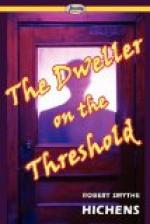His interview with Stepton on the previous night in the presence of Mr. Harding had been rather brief. Stepton had been preoccupied and monosyllabic. Agnes had been right as to his reason for honoring the coast of Kent with his company, but wrong as to the haunted house’s location. It was not in Birchington, but lay inland, within easy reach of Tankerton. When he met Malling and Harding, the professor was going to his hotel, where a motor was waiting to convey him to the house, in which he intended to pass the night. His mind was fixed tenaciously upon the matter in hand. Malling had realized at once that it was not the moment to disturb him by the introduction of any other affair, however interesting. But his suggestion of a meeting the next morning was thus welcomed:
“Right! I shall be at home at churchtime—as you’re not preaching.”
The second half of the sentence was directed to Mr. Harding, who said nothing.
“And you might give me a cup of tea in the afternoon,” the professor had added, looking at the rector rather narrowly before shambling off to his hotel to get the plaid shawl which he often wore at night.
“With the greatest pleasure. Minors is the name of the house,” had been Mr. Harding’s reply.
Whereupon the professor had vanished, muttering to himself:
“Minors! And why not Majors, if you come to that? Perhaps too suggestive of heart-breaking military men. Minors is safer in a respectable seaside place.”
The professor had been up all night, but looked much as usual, and was eating a hearty breakfast of bacon and eggs in the cheerful coffee-room when Malling arrived. He scarcely ever ate at orthodox hours, and had frequently been caught lunching at restaurants in London between four and five in the afternoon.
“Where’s the rector? At church?” was his greeting.
“The rector has gone back to London,” replied Malling, sitting down by the table.
“What about my cup of tea, then?” snapped Stepton.
“I will be your host. I’m here till to-morrow. Any interesting manifestations?”
“A rat or two and a hysterical kitchen-maid seem to be the responsible agents in the building up of the reputation of the house I kept awake in last night.”
“I believe I have a more interesting problem for you.”
The professor stretched out a sinewy hand.
“Cambridge marmalade! Most encouraging!” he muttered. “Have the reverend gentlemen of St. Joseph’s been at it again—successfully?”
“I want you to judge.”
And thereupon Malling laid the case faithfully before the professor, describing not only the dinner in Hornton Street and his interview with Lady Sophia, but also the two sermons he had heard at St. Joseph’s, and the rector’s lamentable outburst of the previous night. This last, having a remarkably retentive memory, he reproduced in the main in Mr. Harding’s own words, omitting only the rector’s reference to his moral lapses. During the whole time he was speaking Stepton was closely engaged with the Cambridge marmalade, and showed no symptoms of attention to anything else. When he ceased, Stepton remarked:




